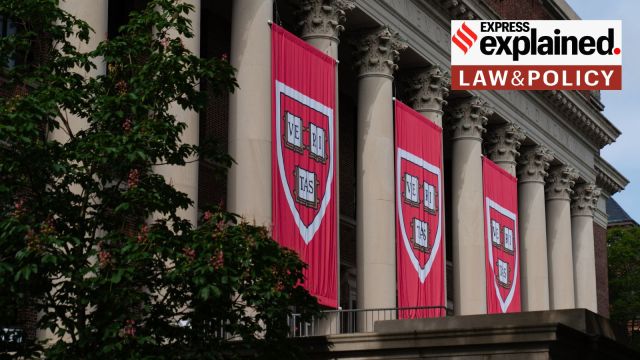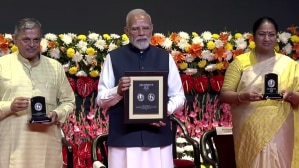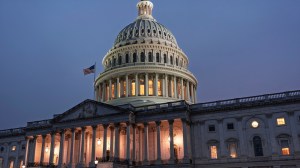Trump administration vs Harvard: What to know about the legal battles
A US federal court on Monday issued a preliminary injunction to block the proclamation signed by President Trump that restricted the admission of foreign nationals to Harvard University
 Harvard is currently suing the Trump administration on two matters – the university’s ability to enrol international students, and to restore draconian federal funding cuts. (NYT)
Harvard is currently suing the Trump administration on two matters – the university’s ability to enrol international students, and to restore draconian federal funding cuts. (NYT)A Boston district judge on Monday (June 23) blocked a proclamation signed by US President Donald Trump on June 4, barring the entry of foreign nationals to Harvard University. The injunction came just hours before a prior temporary restraining order was due to expire, which protected visa holders from being denied entry.
Judge Allison D Burroughs held that Trump had misused a federal law designed to safeguard national security, and agreed with Harvard’s lawyers who said that such presidential power was meant to be used against foreign enemies, not international students.
Harvard is currently suing the Trump administration on two matters – the university’s ability to enrol international students, and to restore draconian federal funding cuts. Monday’s ruling concerns the former and marks the second such court decision within a week on the subject. Judge Burroughs, who is presiding over both cases, issued a similar decision on June 20.
The Trump administration has maintained that it has targeted Harvard for failing to keep Jewish students safe and allowing antisemitism to flourish. As the lawsuits have progressed, the administration has claimed that the university used racial preferences in violation of a Supreme Court ruling.
Here is what to know about the Trump administration’s war against the university, and how the battle has played out legally.
Administration’s bid to “root out” antisemitism
Following countrywide university protests against Israel’s war in Gaza, the Trump administration on February 3 announced the formation of a Task Force to investigate purported antisemitic incidents in ten universities. The Justice Department described the initiative as an attempt to “root out anti-Semitic harassment in schools and on college campuses.”
In March, the Task Force said it was examining about $256 million in federal contracts for Harvard, and a separate $8.7 billion in what it called “multi-year commitments.” It alleged that the university had failed to combat antisemitic harassment.
This was followed by two letters to the university, on April 3 and April 11, seeking “several broad, non-exhaustive areas of reform” that the government viewed as necessary for Harvard to remain “a responsible recipient of federal taxpayer dollars.” The proposed reforms included discontinuing all diversity, equity, and inclusion (DEI) based programs, reporting disciplinary actions for “antisemitic rule violations since October 7, 2023,” and reporting students deemed “hostile to American values”.
On April 14, Harvard’s president, Alan Garber, issued a sternly worded reply refusing to comply with these conditions. He said that the ‘reforms’ violated the university’s First Amendment Rights, including the invasion of university freedoms. He also objected to the threat of federal funding being incumbent on complying with the government’s terms. “The government’s terms also circumvent Harvard’s statutory rights by requiring unsupported and disruptive remedies for alleged harms that the government has not proven through mandatory processes established by Congress and required by law,” he wrote.
On April 16, the Department of Homeland Security (DHS) issued a notice to the university announcing that it had frozen $2.2 million in multiyear grants, as well as a $60 million contract.
Lawsuit 1 – Banning international students
The DHS notice sought information on various foreign national visa holders who have been a part of “illegal and violent” activities within the campus. “Since Hamas’s October 7, 2023, attack on Israel, Harvard’s foreign visa-holding rioters and faculty have spewed antisemitic hate, targeting Jewish students. With a $53.2 billion endowment, Harvard can fund its own chaos—DHS won’t,” the DHS said.
The university was given 15 days to respond to the notice, failing which its Student and Exchange Visitor Program (SEVP) certification would be revoked. Issued by the DHS, the certification allows colleges and universities in the US to enrol international students on F-1, M-1 and J-1 student visas. An F-1 visa authorises international students to attend an academic institution such as a high school or college, while an M-1 visa is needed for students in vocational or technical training programs at recognised schools. Similarly, a J-1 visa is needed for exchange program students.
Without this certification, institutions cannot issue Form I-20, which serves as proof of enrollment and is necessary for visitors to maintain student status.
The university sent a detailed list to the DHS on April 30 with the number and information of enrolled foreign students. The DHS subsequently concluded that Harvard failed to inform the students involved in the protest activities, and sought information about their disciplinary records, as well as their involvement in ‘known illegal and violent activities’. In its reply on May 14, Harvard identified three F-1 visa students who received disciplinary action that changed their academic status, as well as the details of their conduct.
Despite these submissions and Harvard’s expressed willingness to cooperate, US Secretary of Homeland Security Kristi Noem, on May 22, ordered the DHS to revoke Harvard’s SEVP certification. In a letter to the university, Noem wrote that current students would need to transfer or risk losing their legal status. The decision would affect 5,000 international students, as well as 2,000 recent graduates on temporary visas, allowing them to remain in the US after graduation to work, according to a report in The New York Times.
Harvard sued the administration, arguing that the President had exceeded his authority under Title 8, Section 1182(f) of the Immigration and Nationality Act. This clause empowers him to suspend or restrict the entry of noncitizens if such entry is considered ‘detrimental’ to the interests of the country. The university also argued that the Trump administration had violated its First Amendment rights, including academic autonomy and freedom of speech, as well as its Fifth Amendment Rights, namely the Right of Equal Protection, as no other university was treated in the same manner as Harvard. The government refuted these claims, citing national security.
Judge Burroughs, who heard the case, issued a temporary restraining order against the federal action. She ruled that the move would cause “immediate and irreparable injury.”
President Trump attempted to bypass this ruling by issuing a decree on June 4, which said that any foreign national who enrolled at the university would be banned from entering the US. Judge Burroughs issued another temporary restraining order against the move and extended the previous order against Noem’s decree.
On June 20, Judge Burroughs issued a three-page preliminary injunction forbidding the government from “implementing, instituting, maintaining, or giving any force or effect” to remove Harvard from the international student program. The ruling thus allows the university to continue participating in the Student and Visitor Exchange Program.
On Monday, Judge Burroughs issued a ruling against Trump’s June 4 proclamation. “Here, the government’s misplaced efforts to control a reputable academic institution and squelch diverse viewpoints seemingly because they are, in some instances, opposed to this Administration’s own views, threaten these rights. To make matters worse, the government attempts to accomplish this, at least in part, on the backs of international students, with little thought to the consequences to them or, ultimately, to our own citizens,” she wrote.
Lawsuit 2 – Cutting federal funding
Harvard sued the administration on April 21 against the funds freeze, saying the administration was using “leverage to gain control of academic decisionmaking at Harvard”.
The New York Times reported Harvard received seven stop-work orders for research awards between April 14 and May 6, after which 950 such orders totalling $2.4 billion were passed.
The government officially began terminating federal funding to Harvard on May 5, which started a 120-day clock before the impact would become permanent, according to the university. On June 2, the university filed a motion requesting summary judgment by early September, arguing that time was critical. “Once that closeout occurs, Harvard anticipates the government will take the position that no restoration of funds is possible,” the university wrote.
Oral arguments by both parties are scheduled on July 21.



- 01
- 02
- 03
- 04
- 05



































